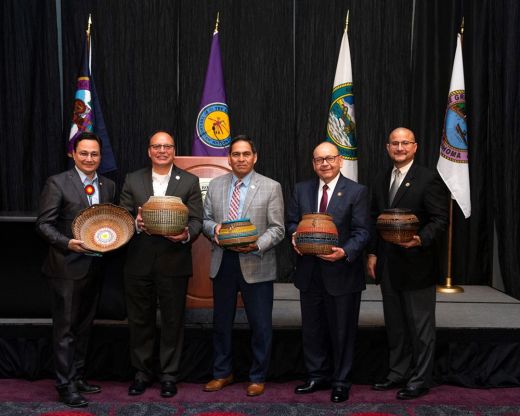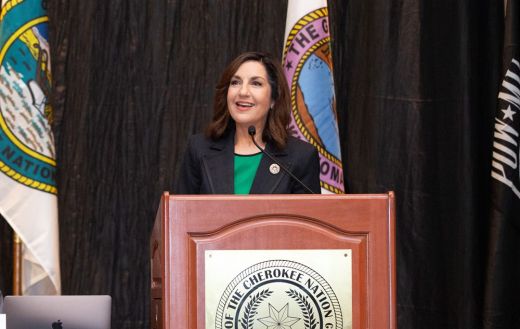
- Details
- By Chickasaw Nation Media
CATOOSA, Okla. – Oklahoma’s State Superintendent of Public Instruction Joy Hofmeister thanked the state’s tribes for their contributions to the state’s educational goals at a quarterly meeting of the Inter-Tribal Council of the Five Civilized Tribes January 10. The quarterly meeting was hosted by the Cherokee Nation at the Hard Rock Hotel and Casino Tulsa.
“My heart is filled with gratitude for the service and the prioritization that you have made over the years for the school children of Oklahoma,” Hofmeister said.
Hofmeister said since the beginning of her term in 2014 the state’s tribes have invested more than $575.8 million in gaming funds to the state’s education system.
“These contributions have steadily risen, despite tribal nations receiving no state subsidies to the gaming industry,” Hofmeister said.
 Oklahoma’s State Superintendent of Public Instruction Joy Hofmeister thanked the state’s tribes for
Oklahoma’s State Superintendent of Public Instruction Joy Hofmeister thanked the state’s tribes for
their investment in Oklahoma’s education system at a Jan. 10 quarterly meeting of
the Inter-Tribal Council of the Five Civilized Tribes.
She said these contributions have also been supplemented by Oklahoma’s Native American tribes, both monetarily and through their educational programs and services.
“On behalf of the State of Oklahoma, again, thank you,” Hofmeister said. “Thank you for supporting public education.”
In addition, the council passed a resolution honoring Lisa Billy for her service as Secretary of Native American Affairs for the State of Oklahoma.
Billy recently resigned from her gubernatorial appointed position following the compact renegotiation dispute between the tribes and Oklahoma Governor Kevin Stitt. Billy currently serves as a legislator for the Chickasaw Nation.
“Today, we thank Lisa Billy for her integrity and legacy for tribal advocacy, and we look forward to seeing how she will use her talents for leadership and politics in the future,” said Chickasaw Nation Governor Bill Anoatubby.
Billy was presented with a medal, a drum and a copy of the resolution honoring her.
“We are mighty in our message of unity,” Billy said. “We continue to move forward.”
Tribal leaders said the state’s many Native American tribes are committed to each other, their communities and their state.
“We are united for Oklahoma,” said Choctaw Nation of Oklahoma Chief Gary Batton.
Other tribal leaders echoed Chief Batton’s message of unity. Seminole Nation of Oklahoma Chief Greg Chilcoat said the tribes work, communicate and move forward together.
Newly-elected Muscogee (Creek) Nation Principal Chief David Hill said the Muscogee (Creek) Nation stands with all tribal nations in the state.
“I’m looking forward to working with each one of you to ensure our partnership is strong and our voices are heard as one,” Principal Chief Hill said.
Tribal leaders said tribal programs and services help more than just the citizens of their respective tribes. They help all Oklahomans.
“Construction and operation of programs and services, combined with governmental and business endeavors, as well as philanthropic and infrastructure projects, make the Chickasaw Nation a crucial driver in the economic activity in our area and in Oklahoma,” said Governor Anoatubby. He said these economic benefits are offered by all of the state’s tribes.
“The five tribes are the best friends that the state of Oklahoma has ever had,” said Cherokee Nation Principal Chief Chuck Hoskin Jr.
The council voted for Principal Chief Hoskin and Principal Chief Hill as the council’s new president and vice president, respectively, in a routine changing of officers. Terri Haney was reelected as council treasurer.
In addition to the resolution honoring Billy, the council passed five other resolutions:
- A resolution supporting restoration of the Earned Income Tax Credit.
- A resolution urging the Office of Juvenile Justice and Delinquency Prevention (OJJDP), Office of Justice PROGRAMS United States Department of Justice, to hold a tribal consultation and develop an OJJDP tribal policy in conformance with the Juvenile Justice Reform Act of 2018.
- A resolution urging congress to reauthorize the Special Diabetes Program for Indians.
- A resolution urging renewal of the Oklahoma Advisory Council on Indian Education Act.
- A resolution supporting Oklahoma State Department of Health adoption of immunization rule changes.
More Stories Like This
Bard College Center for Indigenous Studies (CfIS) Hosts Annual Symposium With Keynote Speaker Miranda Belarde-Lewis on March 9–10American Indian College Fund Announces Spring 2026 Faculty Fellow Cohort
Navajo Nation Signs $19 Million Diné Higher Education Grant Fund Act into Law
Dr. Shelly C. Lowe to Be Inaugurated as IAIA President March 26–27
Tlingit Language Courses Expand for Students to Learn With Families At-Home
Help us defend tribal sovereignty.
At Native News Online, our mission is rooted in telling the stories that strengthen sovereignty and uplift Indigenous voices — not just at year’s end, but every single day.
Because of your generosity last year, we were able to keep our reporters on the ground in tribal communities, at national gatherings and in the halls of Congress — covering the issues that matter most to Indian Country: sovereignty, culture, education, health and economic opportunity.
That support sustained us through a tough year in 2025. Now, as we look to the year ahead, we need your help right now to ensure warrior journalism remains strong — reporting that defends tribal sovereignty, amplifies Native truth, and holds power accountable.
 The stakes couldn't be higher. Your support keeps Native voices heard, Native stories told and Native sovereignty defended.
The stakes couldn't be higher. Your support keeps Native voices heard, Native stories told and Native sovereignty defended.
Stand with Warrior Journalism today.
Levi Rickert (Potawatomi), Editor & Publisher
